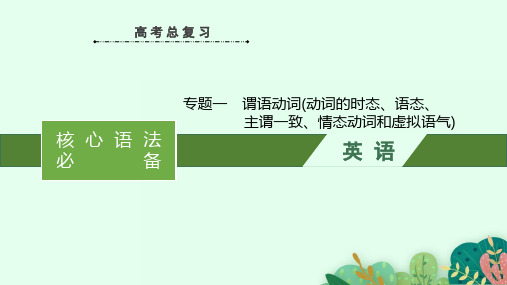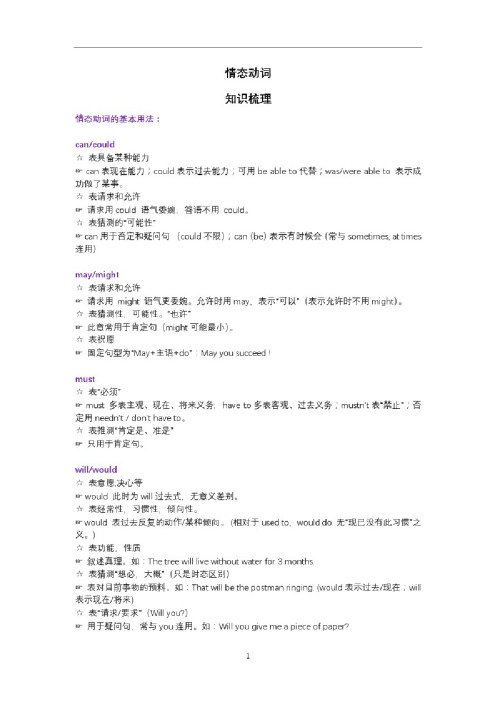(项目管理)情态动词是高考考查的重点语法项目之一
高考英语二轮总复习 核心语法必备 专题一 谓语动词(动词的时态、语态、主谓一致、情态动词和虚拟语气)

cook, draw等, 常与well, easily,
这件衬衫不好洗。
smoothly等副词连用
open, close, lock, move, keep等动词常 The drawer won't lock.
与won't, can't, wouldn't 连用
这个抽屉锁不上。
重点一
重点二
重点三
重点四
意义 集体名词class, family, army, team, club, company, population, 单
一致 enemy, party, crew, audience, committee, government, majority, 复
原则 group等强调整体时谓语动词用单数, 指个体成员时谓语动词用 数
代词
单个的动词-ing形式、动词不定式或主语从句
重点一
重点二
重点三
重点四
原则
主语
谓语
由and连接的两个并列成分表示两个不同的概念
有生命的集体名词, 如people, police, cattle等 一些常用作复数或只有复数形式的名词, 如goods,
stairs,
arms等
复数
山脉、群岛、瀑布等以-s结尾的专有名词
重点三 主谓一致3原则
原则
主语
谓语
语法 单数
单数
一致 原则
复数
复数
就近 一致 原则
由or, either... or..., neither... nor...,
not only... but (also)..., not... but... 等连接
与最近的主语在单复数上 保持一致
高考情态动词考点

学生作文中的情态动词常见错误及避免方法
混淆情态动词的意义
要准确把握每个情态动词的基本意义和用法,避 免混淆。
忽略情态动词的搭配
要了解并熟练掌握情态动词的常见搭配和用法, 避免不必要的错误。
误用情态动词的形式
要注意正确使用情态动词的各种形式,如时态、 语态、语气等。
不重视情态动词的语气
要注意根据文章的语境和需要,选择适当的情态 动词语气,避免过于单一或过于强烈。
will/would的用法
总结词
表示意愿、推测或习惯
详细描述
will/would表示说话人的意愿或推测,通常用于第一人称疑 问句中表示询问意愿或建议。在陈述句中,would可以表示 过去的习惯或常规行为。在虚拟语气中,would可以表示对 未来的虚拟假设。
03
情态动词的特殊用法及辨析
can和could表示“可能”的用法
情态动词在英语中具有极高的使用频率,是 语言表达中不可或缺的元素。
情态动词的分类及用法
01
02
03
04
05
根据不同的功能和用法 ,情态动词可以分为四 大类:表必要性的情态 动词、表可能性的情态 动词、表许可的情态动 词和表意愿的情态动词 。
表必要性的情态动词有 must、need、have to 等,表示“必须”或“ 必要”的意思。
总结词
表示能力、可能性或惊讶
详细描述
can/could表示能力或可能性,通常用于一般现在时和一般过去时。在疑问句和否定句中,could不表示过去 时态,而是表示委婉或可能性较小的询问。
may/might的用法
总结词
表示可能性、请求许可或猜测
详细描述
may/might表示对某事物的可能性的猜测或推测,通常用于一般现在时和一般过去时。在口语中, may也常用于提出请求或询问许可。might比may更不确定,通常用于虚拟语气中。
超实用高考英语一轮复习:语法专题:情态动词和虚拟语气 课件

语前,构成倒装
你要是见到玛丽,会认不出她的。
当主句和从句时间不一致时,主
错综时间
If you had taken my advice then, you wouldn't be in trouble now.
句和从句要根据各自所指的具
条件句
要是你当时听我的劝,你现在就不会有麻烦了。
体时间选用适当的时态
1. 用于非真实条件句 (2)其他用法
用法
说明
示例
The dish would have been better with a bit less salt.
ቤተ መጻሕፍቲ ባይዱ
有时,假设的条件不通过条件状 少放些盐,这道菜会更可口的。
含蓄 语从句表达,而是隐含在某些词 Under such circumstances I would probably have done the same.
表示征求对方的意见或请求指 咱们晚上见好吗?
示
You shall not smoke.不准抽烟。(警告) shall
用于第二、第三人称的陈述句, There shall be no talking during the test.
表示允诺、规定、命令、警告 考试过程中不允许交谈。(规定)
等
You shall have a new computer if you do well in the exam.
Beijing may/might well be changing faster than any other city on earth.北京的变化可能比世界上其他任何一个城市都快。
may/might as well倒不如,不妨
It is very late, so you may/might as well go to bed. 很晚了,所以你还是去睡吧。
高考英语二轮复习课件核心语法必备 专题 谓语动词(动词的时态、语态、主谓一致、情态动词和虚拟语气)

复数
视
单复数同形的名词, 如means, deer, fish, sheep等
情
all, none, some, any等不定代词
况
“half/most/part/the rest/the last/lots/plenty/分数/百分数+of+名词” 而
做主语, 谓语要和of之后的名词单复数保持一致
By the time Jack returned home from
表示一个动作或状态从过去 England, his son had graduated from 某一时间之前已经开始, 一直 college. 持续到过去这一时刻的动作 杰克从英国回到家中时, 他的儿子已经大
学毕业。
重点一
重点二
高考总复习
核心语法
必
备
专题一 谓语动词(动词的时态、语态、 主谓一致、情态动词和虚拟语气)
英语
内容索引
要点精讲•破疑解难 对点演练•精准提升
要点精讲•破疑解难
重点一 热考的5种时态
考点1 一般现在时(am/is/are或do/does)
用法
例句
表示现在经常性、习惯性、 反复性的动作或状态
Susan talks every night in her dream. It
重点一
重点二
重点三
重点四
考点4 过去完成时(had+动词过去分词)
用法
例句
表示在过去某一时间或过去 The film had begun when we got to the
某一动作之前已经发生并完 cinema yesterday.
成的动作, 即“过去的过去” 昨天我们到达电影院时, 电影已经开始了。
高考英语语法专题复习-情态动词和虚拟语气

情态动词重点难点解析情态动词的高考命题导向:情态动词表示说话者的情感和态度,有一定的含义,但是不能单独做谓语,必须与其他动词连用。
注意区别具有相同功能的,意思相近的情态动词的用法。
二“情态动词+进行式”和“情态动词+完成式”用法一览表填入情态动词的恰当形式或根据括号所提供的词填入情态动词恰当的结构。
1. I should have been there, but I ____________ find the time.2. Helen _______ go on the trip with us, but she isn’t quite sure yet.3. Tom, you ___________ not leave all your clothes on the floor like this!4. You can’t imagine that a well behaved gentleman _____________ be so rude to a lady.5. It has been announced that candidates_____________ remain in their seats until all thepapers have been collected.6. ---Lucy doesn’t mind lending you her dictionary.---She ____________. I’ve already borrowed one.7. John, look at the time. _______________ you play the piano at such a late hour?8. ---__________ this book be yours?---No, it ____________ not be mine. It ___________ be his.9.As a girl, she ____________ get up at six every day.10.__________ he to clean the classroom after school?11.You ____________ be tired after the long trip, aren’t you?12.---What’s the name?---Khulaifi. __________ I spell that for you?13.You _____________________ (see) the film, haven’t you?14.You _____________________ (talk) on the phone at that time, for I couldn’t get through.15.They _____________________ (miss) the plane, or perhaps they have been prevented fromcoming for some reason.16.______________ you pass the college entrance examinations!17.He had known the matter before you told him, so you _________________ (not tell) it to him.虚拟语气重点难点解析虚拟语气的高考命题导向:虚拟语气表示说话人的愿望、假设、猜测或建议,而不是表示客观存在的事实。
高中英语高考语法易错知识点10.情态动词(考点梳理+易错点)

情态动词知识梳理情态动词的基本用法:can/could*表具备某种能力叱can表现在能力;could表示过去能力;可用be able to代替;was/were able to表示成功做了某事。
*表请求和允许叱请求用could语气委婉,答语不用couldo*表猜测的•可能性"吐can用于否定和疑问句(could不限);can(be)表示有时候会(常与sometimes,at times 连用)may/might*表请求和允许计请求用might语气更委婉:,允许时用may,表示•可以11(表示允许时不用might)。
六表猜测性,可能性。
"也许"叱此意常用于肯定句(might可能最小)。
六表祝愿吐固定句型为"May+主语+d。
":May you succeed!must*表“必须"wmust多表主观、现在、将来义务;have to多表客观、过去义务;mustrYt表噤止”;否定用needn't/don't have to。
介表推测。
肯定是、准是.吐只用于肯定句。
will/would六表意愿,决心等w would此时为will过去式,无意义差别。
六表经常性,习惯性,倾向性。
叱would表过去反复的动作/某种倾向。
(相对于used to,would do无"现已没有此习惯”之义。
)*表功能.性质叱叙述真理,如:The tree will live without water for3months.女表猜测11想必,大概•(只是时态区别)吐表对目前事物的预料。
如:That will be the postman ringing(would表示过去/现在;will 表示现在/将来)六表“请求/要求-(Will yoiP)用于疑问句,常与you连用。
如:Will you give me a piece of paper9shall(否:shan't)六表征求意见•…好不好.*用在第一、三人称°如:Shall the reporters wait outside or what9六表允诺、威胁、警告、命令或根据规定有义务做吐用于第二、第三人称。
广东高职高考英语语法考点-情态动词
(2)作实义动词,有人称、时态、数的变化,后接不定式,在否定
句和疑问句中to可省略。
知识要点
He dare(情态V.) not ask the teacher questions.
如:He doesn't dare(行为V.) (to) ask the teacher questions. 他 不敢问老师问题。
情态动词
modal verb
Liu Ting
知识要点
知识点一 情态动词的定义 情态动词(modal verbs)本身有一定的词义,但是不能独立作谓语 ,只能和动词原形一起构成谓语。情态动词用在行为动词前, 表示说话人对这一动作或状态的看法或主观设想。情态动词虽 然数量不多,但用途广泛。情态动词主要有can (could), may (might), must, need, ought to, dare (dared), shall (should), will (would)等。 如:I can read this sentence in English. 我能用英语读这句话。 I can't read this sentence in English. 我不能用英语读这句话。
知识要点
【例3】 ________ you wait a few more minutes? It'll be your
turn soon.( )
A. Must B. Should C. Could
D. Might
答案 C
【解析】 本题考查情态动词的用法。在表请求或建议的句
型中一般用could。
知识点四 情态动词表推测的用法
,你们不必买。 (2)作实义动词(行为V.),有人称、时态、数的变化,后接带
专题03 动词时态及其语态、情态动词和虚拟语气(解析版)
专题03 动词时态及其语态、情态动词和虚拟语气【2020年高考命题预测】动词的时态和语态是历年高考的重点,是高考的必考点。
应特别注意以下几点:要把握各种时态的特点,注意易混淆时态间的差异;准确理解具体语境下时态的正确意义,捕捉句子中所隐含的时间信息;要克服汉语式的惯性思维,排除误导,培养发散性思维。
高考中常考的时态有一般现在时、一般过去时、一般将来时、现在进行时、过去进行时、过去将来时、现在完成时、过去完成时、将来进行时、现在完成进行时、过去完成进行时等等。
学习时要注意总结规律,灵活使用,特别要注意一些时态的特殊用法。
高考主要以单项填空、语法填空、短文改错等形式考查,动词的时态和语态在语法填空和短文改错中是必考点。
2020年时态和语态还将是高考中的重点和难点所在。
在这个考点上一定多下工夫,不管花费多大的精力,让学生掌握这个考点都不为过,因为,打开2020年的高考试卷,不然会有动词的时态和语态。
高考中的情态动词和虚拟语气考点是高考中的次重点内容,对学生要求掌握的程度要适可而止,尤其是全国卷。
英语中常用的情态动词主要有can,could,may,might,must,will,would,shall,should,ought to,dare,need,used to,had better等。
在学习情态动词时应注意以下几点:同一情态动词表示不同的意义的情况;情态动词后跟各种形式的用法;特别是注意“情态动词+完成式”是高考中的重点所在。
高考中的虚拟语气一般与情态动词结合进行考查。
每年高考试题中都会出现一定的题目。
【学科网考点定位】2020考纲解读和近三年考点分布课程标准要求中学生掌握常见的十种时态用法。
近三年来各地试题考查最多的是一般过去时、过去完成时、过去进行时、现在完成进行时和现在完成时。
高考中动词时态命题,每年每份试卷中都有2~3个小题,每小题均设置明确的语境。
一般来说,命题人总是把易混淆或相近的时态放在一起,增加考题的难度。
- 1、下载文档前请自行甄别文档内容的完整性,平台不提供额外的编辑、内容补充、找答案等附加服务。
- 2、"仅部分预览"的文档,不可在线预览部分如存在完整性等问题,可反馈申请退款(可完整预览的文档不适用该条件!)。
- 3、如文档侵犯您的权益,请联系客服反馈,我们会尽快为您处理(人工客服工作时间:9:00-18:30)。
情态动词是高考考查的重点语法项目之一,下面英语网编辑整理了近几年来高考试题中出现的情态动词的考点进行归纳分析,以便同学们复习掌握。
一、情态动词表推测 1. 肯定的推测一般用must, should, may(might)或could(不用can),其中,must的语气最强,译为“肯定”、“准是”、“想必是”;should的语气次之,译为“很可能”、“应该”,指按常理推测;may(might),could的语气最弱,译为“也许”、“可能”。
①Helen _______ go on the trip with us but she isn't quite sure yet. (2005年安徽卷)
A. shall B. must C. may D. can
②—I've taken someone else's green sweater by mistake. —It ___ Harry's. He always wears green. (2005年广东卷) A. has to be B. will be C. mustn't be D. could be
③I have lost one of my gloves. I _______ it somewhere.(2005年北京春季卷) A. must drop B. must have dropped C. must be dropping D. must have been dropped ④If I ____ plan to do anything I wanted to ,I'd like to go to Tibet and travel through as much of it as possible. (2005年湖北卷)
A. would B. could C. had to D. ought to
2. 否定推测分为两种情况: 1)语气不很肯定时,常用may not, might not或could not,译为“可能不”、“也许不”。
You might just as well tell the manufacturer that male customers ______ not like the design of the furniture. (2004年上海春季卷) A. must B. shall C. may D. need
2)否定语气较强时,则用can't,译为“根本不可能”、“想必不会”,表示惊异、怀疑的感情色彩。
①—Do you know where David is? I couldn't find him anywhere. —Well. He ______ have gone far——his coat's still here.(2005年湖北卷) A. shouldn't B. mustn't C. can't D. wouldn't
②— Isn't that Ann's husband over there? — No, it _______ be him I'm sure he doesn't wear glasses. (2004年全国卷Ⅰ)
A. can't B. must not C. won't D. may not
3. 疑问句中的推测,往往用can或could。 Mr. Bush is on time for everything. How ______ it be that he was late for the opening ceremony?(2001年上海春季卷)
A. can B. should C. may D. must
4. 对已发生事情的肯定推测常用“must, may, might等+完成式”;否定推测常用“can, could, may, might等+完成式”。
①I was on the highway when this car went past followed by a police car. They _______ at least 150 kilometers an hour.(2005年重庆卷)
A. should have been doing B. must have been doing C. could have done D. would have done ②He _______ have completed his work; otherwise, he wouldn't be enjoying himself by seaside. (2005年北京卷) A. should B. must C. wouldn't D. can't
③—Tom is never late for work. Why is be absent today? —Something ________ to him. (2005年江西卷) A. must happen B. should have happened
C. could have happened D. must have happened ④ My sister met him at the Grand Theatre yesterday afternoon, so he_____ have attended your lecture.(2000年上海卷)
A. couldn't B. needn't C. mustn't D. shouldn't
二、“情态动词+完成式” 1. “should(ought to)+完成式”表示本应该做某事而实际上没有做。其否定式表示某种行为不该发生但却发生了。
①—I'll tell Mary about her new job tomorrow. — You________ her last week. (2004年福建卷) A. ought to tell B. would have told C. must tell D. should have told ②Oh, I'm not feeling well in the stomach, I _____ so much fried chicken just now. (2002年上海春季卷)
A. shouldn't eat B. mustn't have eaten C. shouldn't have eaten D. mustn't eat 2. “could+完成式”表示本来能够做成某事的但结果没能做成,含有遗憾的意味。 He paid for a seat, when he ______ have entered free. (2005年山东卷) A. could B. would C. must D. need
3. “needn't+不定式的完成式”表示本来不必做某事而实际上做了某事。例如: You needn't have watered the flowers, for it is going to rain.你本不需要浇花的,因为天就要下雨了。
— Catherine, I have cleaned the room for you. — Thanks. You ______ it. I could manage it myself. (2005年福建卷) A. needn't do B. needn't have done C. mustn't do D. shouldn't have done
三、常见的情态动词 1. shall用于一、三人称疑问句表示征求对方意见;用于二、三人称陈述句表示说话人给对方的命令、警告、允诺或威胁等。
①“The interest be divided into five parts, according to the agreement made by both sides,” declared the judge. (2004年重庆卷)
A. may B. should C. must D. shall
②—Excuse me, but I want to use your computer to type a report. — You ______ have my computer if you don't take care of it. (2004年湖南卷)
A. shan't B. might not C. needn't D. shouldn't
③ — The room is so dirty. ______ we clean it? — Of course. (2003年北京春季卷) A. Will B. Shall C. Would D. Do 2. must用于疑问句,表示责备、抱怨的感情色彩,意思为“偏偏,偏要”;mustn't表示禁止,是说话人强有力的劝告。
①John, look at the time. _______ you play the piano at such a late hour? (2005年全国卷Ⅲ)
A. Must B. Can C. May D. Need
②Tom, you leave all your clothes on the floor like this!(2005年全国Ⅰ)
A. wouldn't B. mustn't C. needn't D. may not
3. needn't表示“没有必要”。 — Lucy doesn't mind lending you her dictionary. — She ______. I've already borrowed one. (2005年湖南卷) A. can't B. mustn't C. needn't D. shouldn't
4. would表示过去反复发生的动作或某种倾向。 When he was there, he ___ go to that coffee shop at the corner after work every day.(1996年上海卷)
A. would B. should C. had better D. might
5. 表示经过努力而成功的某一次动作,只能用was/were able to,而不能用could。 The fire spread through the hotel very quickly but everyone _____ get out. (1997年全国卷)
